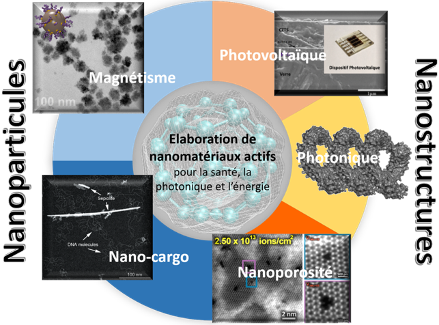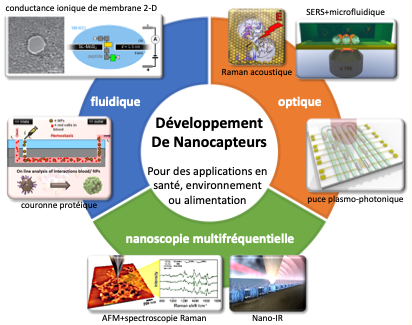
PRESENTATION
The Nanosciences department aims to access and act at the nanometric scale in order to target, detect and understand the underlying mechanisms driving the macroscopic response.
For this, he imagines and invents nanomaterials capable of responding at the nanometric scale to an external stimulus (electrical, magnetic, optical, chemical) as well as extremely sensitive nanosensors and nanocharacterization tools. These innovations are essential to solving many societal problems in the fields of health, the environment or the food industry.
The Nanosciences department is strongly interdisciplinary and has skills in chemistry, physico-chemistry, physics, biophysics, materials science and numerical simulation. It has 18 permanent staff (teacher-researchers, researchers and engineers) and around ten non-permanent staff (doctoral students, post-doctoral students). It is organized into two thematic axes which are strongly interconnected:
Aymeric LERAY
HEAD
Aymeric.Leray@u-bourgogne.fr
Phone : 03 80 39 59 04
Lionel MAURIZI
CO-HEAD
Lionel.Maurizi@u-bourgogne.fr
Phone : 03 80 39 61 71
- kc_data:
- a:7:{s:4:"mode";s:2:"kc";s:3:"css";s:0:"";s:9:"max_width";s:0:"";s:7:"classes";s:0:"";s:9:"thumbnail";s:0:"";s:9:"collapsed";s:0:"";s:9:"optimized";s:0:"";}
- kc_raw_content:
- [kc_row use_container="yes" _id="717207"][kc_column width="12/12" video_mute="no" _id="814314"][kc_spacing height="20px" _id="902133"][/kc_column][/kc_row][kc_row use_container="yes" _id="135995"][kc_column width="59.55%" _id="651754"][kc_column_text _id="69602"]
PRESENTATION
The Nanosciences department aims to access and act at the nanometric scale in order to target, detect and understand the underlying mechanisms driving the macroscopic response.
For this, he imagines and invents nanomaterials capable of responding at the nanometric scale to an external stimulus (electrical, magnetic, optical, chemical) as well as extremely sensitive nanosensors and nanocharacterization tools. These innovations are essential to solving many societal problems in the fields of health, the environment or the food industry.
The Nanosciences department is strongly interdisciplinary and has skills in chemistry, physico-chemistry, physics, biophysics, materials science and numerical simulation. It has 18 permanent staff (teacher-researchers, researchers and engineers) and around ten non-permanent staff (doctoral students, post-doctoral students). It is organized into two thematic axes which are strongly interconnected:
[/kc_column_text][kc_spacing height="40px" _id="624708"][/kc_column][kc_column width="40.44%" _id="242476"][kc_spacing height="20px" _id="466677"][kc_column_text _id="517135"]Aymeric LERAY
HEAD
Aymeric.Leray@u-bourgogne.fr
[/kc_column_text][kc_spacing height="20px" _id="639985"][kc_column_text _id="321246"]
Phone : 03 80 39 59 04Lionel MAURIZI
CO-HEAD
Lionel.Maurizi@u-bourgogne.fr
[/kc_column_text][/kc_column][/kc_row][kc_row _id="738549"][kc_column width="28%" video_mute="no" _id="19516"][kc_single_image image_size="full" _id="906409" image_source="media_library" image="42126" on_click_action="open_custom_link" custom_link="https://icb.u-bourgogne.fr/elaboration-de-nanomateriaux-fonctionnels/||"][kc_spacing height="40px" _id="794979"][kc_call_to_action layout="2" title="ÉLABORATION DE NANOMATÉRIAUX FONCTIONNELS" desc="__empty__" button_show="yes" _id="713484" css_custom="{`kc-css`:{`any`:{`description`:{`color|.kc-cta-desc .kc-cta-text`:`#1e73be`,`text-align|.kc-cta-desc .kc-cta-text`:`center`},`button`:{`color|.kc-cta-button a`:`#000000`,`background-color|.kc-cta-button a`:`#ffffff`}}}}" button_text="EN SAVOIR PLUS" button_link="https://icb.u-bourgogne.fr/elaboration-de-nanomateriaux-fonctionnels/||"][/kc_column][kc_column width="4%" video_mute="no" _id="400020"][/kc_column][kc_column width="28%" video_mute="no" _id="228043"][kc_single_image image_size="full" _id="165768" image_source="media_library" image="42125" on_click_action="open_custom_link" custom_link="https://icb.u-bourgogne.fr/developpement-de-nanocapteurs-et-nanoscopie/||"][kc_spacing height="20px" _id="818971"][kc_call_to_action layout="2" title="DÉVELOPPEMENT DE NANOCAPTEURS ET NANOSCOPIE" desc="__empty__" button_show="yes" _id="588281" css_custom="{`kc-css`:{`any`:{`title`:{`color|.kc-cta-desc h2`:`#1e73be`,`text-align|.kc-cta-desc h2`:`center`},`description`:{`color|.kc-cta-desc .kc-cta-text`:`#1e73be`},`button`:{`background-color|.kc-cta-button a`:`#ffffff`}}}}" button_text="EN SAVOIR PLUS" button_link="https://icb.u-bourgogne.fr/developpement-de-nanocapteurs-et-nanoscopie/||"][/kc_column][kc_column width="4%" video_mute="no" _id="189577"][/kc_column][kc_column width="32%" video_mute="no" _id="208570"][kc_column_text _id="212188"]
Phone : 03 80 39 61 71MEMBERS
[/kc_column_text][kc_spacing height="11px" _id="120297"][kc_single_image image_size="141x100" _id="812068" image_source="media_library" image="42334"][kc_column_text _id="217900"]{slide= Permanents}
Cyrille ANDRES (MCF)
Véronique BERARD (MCF)
Julien BOUDON (MCF)
Eric BOURILLOT (MCF)
Denis CHAUMONT (MCF)
Thierry DAVID (MCF)
Patrice DELARUE (MCF)
Alain DEREUX (PR)
Eric FINOT (PR)
Michaele HERBST (AI)
Françoise LEBRUN (T)
Aymeric LERAY (CR)
Eric LESNIEWSKA (PR)
Laurent MARKEY (IR)
Lionel MAURIZI (CR)
Nadine MILLOT (PR)
Adrien NICOLAI (MCF)
Olivier PIETREMENT (CR)
Lucien SAVIOT (DR)
Patrick SENET (PR){/slide}
{slide= Non-permanents}
Adem DAHI
Mahran BECHETNIA
Dorra BEN ELKADHI
Laura CONVERT
Irma CUSTOVIC
William D'ODET D'ORSONNENS
Pierre-Louis DESCOURS
Marie GARNIER
Sylvain HERNANDEZ SABIO
Eduardo HERNANDO ABAD
Leya LIU
Mélanie ROMAIN
Sajana SEMI
Charif TAMIN
Arielle TCHINDA SONHAPI{/slide}
[/kc_column_text][kc_spacing height="40px" _id="107420"][kc_column_text _id="643613"]SCIENTIFIC
[/kc_column_text][kc_spacing height="11px" _id="793106"][kc_single_image image_size="85x100" _id="805294" image_source="media_library" image="42129" on_click_action="open_custom_link" custom_link="https://icb.u-bourgogne.fr/publications-scientifiques-nanosciences/|Publications scientifiques|"][/kc_column][kc_column width="4%" video_mute="no" _id="753804"][/kc_column][/kc_row]
PUBLICATIONS



